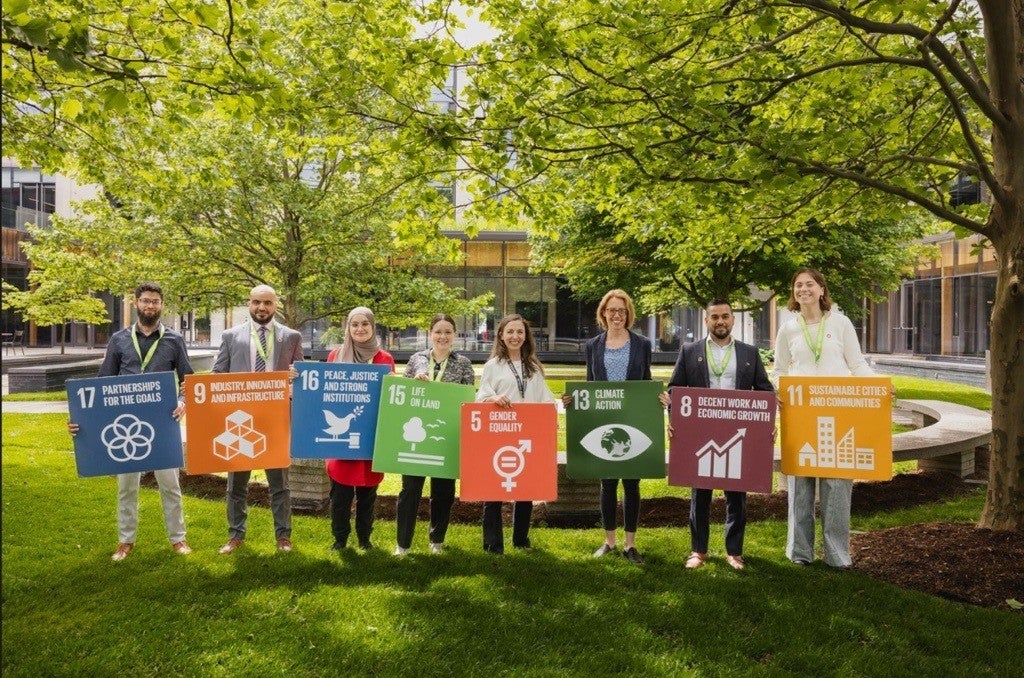ESGTree raises the profile of sustainable finance in Canada

Grebel Peace Incubator start-up ESGTree played a key role in this year’s Together | Ensemble Conference that was held in Waterloo on May 28 and 29. Organized by Sustainable Development Solutions Network Canada, this national event aims to spark progress on the United Nations Sustainable Development Goals (SDGs). The conference brought together experts from universities, governments, and the private sector to explore three high-impact areas for sustainable development: Sustainable Finance, Future Cities & Housing, and AI & Emerging Tech for Eco-Innovation.
The conference featured keynote addresses by prominent speakers such as J.P. Gladu, Helen Kerr, and Ajay Agarwal. Gladu emphasized the untapped potential of Indigenous prosperity and its critical role in Canada’s net-zero goals, highlighting the importance of incorporating Indigenous perspectives into the broader economic framework. Kerr addressed city planning amidst polycrisis, focusing on the challenges of extreme weather, Earth system changes, ecosystem collapse, and an aging population, stressing the need for future-proof urban development. Agarwal discussed the disruptive power of predictive AI, highlighting its significant environmental impact and warning that AI's carbon footprint, currently 1% of global emissions, could rise to 7%, rivaling that of the cement industry.
ESGTree leveraged their networks and expertise in enabling investors to track the environmental, social, and governance (ESG) performance of companies to organize the entire Sustainable Finance stream of the conference. In addition to the keynote talk by Gladu, this included plenary panels on “The Spectrum of Sustainable Investment” and “Integrating ESG From Seed to Scale,” and two fireside chats.

During one of the fireside chats, Samuel Akyianu from the Mastercard Foundation emphasized the importance of empowering teams to champion ESG investing. This approach, also known as impact investing, directs capital towards projects addressing climate change, resource efficiency, and social inclusion. The growth of sustainable finance is driven by increasing awareness of climate impacts, resource scarcity, social inequalities, and regulatory pressure. Standards like the EU’s Sustainable Finance Disclosure Regulation (SFDR) and the Task Force on Climate-related Financial Disclosures (TCFD), now part of the International Sustainability Standards Board (ISSB), support this trend. Integrating ESG factors enhances risk management and fosters innovation in green technologies, however, challenges remain. Traditional funds often avoid impact investing due to fiduciary duties and concerns about returns. Private capital investors focus on known returns, overlooking high-impact but less well-known areas. Short-termism, high initial costs, and lower liquidity in sustainable finance markets further deter investment in long-term sustainable projects. Despite these challenges, the long-term benefits of ESG investing are clear.
Other contributors to the conference with connections to the Centre for Peace Advancement included Master of Ceremonies Leah Feor, who was a past winner and campus lead for the Map the System competition at the University of Waterloo, and Sean Campbell, founder of Union Sustainable Development Co-operative and Grebel Peace Incubator alum, who contributed to a plenary panel on the future of housing in Canada.
Overall, the conference successfully highlighted the integral role of sustainable finance in fostering a more equitable and resilient world. By bringing together thought leaders and practitioners, the event underscored the need for collaborative efforts in advancing the SDGs and harnessing the power of technology and ethical finance to achieve sustainable growth. If you want to learn more about the event, check out the 2024 conference report.
By Pinar Gurgen